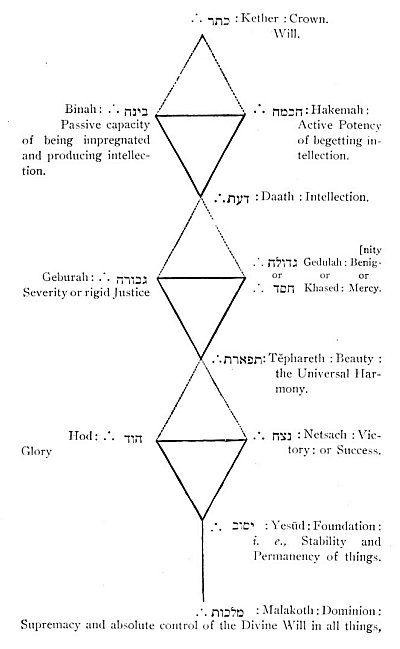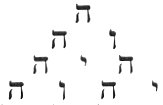While yet the first oaks still put forth their leaves, man lost the perfect knowledge of the One True God, the Ancient Absolute Existence, the Infinite Mind and Supreme Intelligence; and floated helplessly out upon the shoreless ocean of conjecture. Then the soul vexed itself with seeking to learn whether the material Universe was a mere chance combination of atoms, or the work of Infinite, Uncreated Wisdom: . . whether the Deity was a concentrated, and the Universe an extended immateriality; or whether He was a personal existence, an Omnipotent, Eternal, Supreme Essence, regulating matter at will; or subjecting it to unchangeable laws throughout eternity; and to Whom, Himself Infinite and Eternal, Space and Time are unknown. With their finite limited vision they sought to learn the source and explain the existence of Evil, and Pain, and Sorrow; and so they wandered ever deeper into the darkness, and were lost; and there was for them no longer any God; but only a great, dumb, soulless Universe, full of mere emblems and symbols.
You have heretofore, in some of the Degrees through which you have passed, heard much of the ancient worship of the Sun, the Moon, and the other bright luminaries of Heaven, and of the Elements and Powers of Universal Nature. You have been made, to
p. 584
some extent, familiar with their personifications as Heroes suffering or triumphant, or as personal Gods or Goddesses, with human characteristics and passions, and with the multitude of legends and fables that do but allegorically represent their risings and settings, their courses, their conjunctions and oppositions, their domiciles and places of exaltation.
Perhaps you have supposed that we, like many who have written on these subjects, have intended to represent this worship to you as the most ancient and original worship of the first men that lived. To undeceive you, if such was your conclusion, we have caused the Personifications of the Great Luminary of Heaven, under the names by which he was known to the most ancient nations, to proclaim the old primitive truths that were known to the Fathers of our race, before men came to worship the visible manifestations of the Supreme Power and Magnificence and the Supposed Attributes of the Universal Deity in the Elements and in the glittering armies that Night regularly marshals and arrays upon the blue field of the firmament.
We ask now your attention to a still further development of these truths, after we shall have added something to what we have already said in regard to the Chief Luminary of Heaven, in explanation of the names and characteristics of the several imaginary Deities that represented him among the ancient races of men.
ATHOM or ATHOM-RE, was the Chief and Oldest Supreme God of Upper Egypt, worshipped at Thebes; the same as the OM or AUM of the Hindu_s, whose name was unpronounceable, and who, like the BREHM of the latter People, was “The Being that was, and is, and is to come; the Great God, the Great Omnipotent, Omniscient, and Omnipresent One, the Greatest in the Universe, the Lord;” whose emblem was a perfect sphere, showing that He was first, last, midst, and without end; superior to all Nature-Gods, and all personifications of Powers, Elements, and Luminaries; symbolized by Light, the Principle of Life.
AMUN was the Nature-God, or Spirit of Nature, called by that name or AMUN-RE, and worshipped at Memphis in Lower Egypt, and in Libya, as well as in Upper Egypt. He was the Libyan Jupiter, and represented the intelligent and organizing force that develops itself in Nature, when the intellectual types or forms of bodies are revealed to the senses in the world’s order, by their
p. 585
union with matter, whereby the generation of bodies is effected. He was the same with Kneph, from whose mouth issued the Orphic egg out of which came the Universe.
DIONUSOS was the Nature-God of the Greeks, as AMUN was of the Egyptians. In the popular legend, Dionusos, as well as Hercules, was a Theban Hero, born of a mortal mother. Both were sons of Zeus, both persecuted by Here. But in Hercules the God is subordinate to the Hero; while Dionusos, even in poetry, retains his divine character, and is identical with Iacchus, the presiding genius of the Mysteries. Personification of the Sun in Taurus, as his ox-hoofs showed, the delivered earth from the harsh dominion of Winter, conducted the mighty chorus of the Stars, and the celestial revolution of the year, changed with the seasons, and underwent their periodical decay. He was the Sun as invoked by the Eleans, Πυριγενης, ushered into the world amidst lightning and thunder, the Mighty Hunter of the Zodiac, Zagreus the Golden or ruddy-faced. The Mysteries taught the doctrine of Divine Unity; and that Power Whose Oneness is a seeming mystery, but really a truism, was Dionusos, the God of Nature, or of that moisture, which is the life of Nature, who prepares in darkness, in Hades or Iasion, the return of life and vegetation, or is himself the light and change evolving their varieties. In the Egean Islands he was Butes, Dardanus, Himeros or Imbros; in Crete he appears as Iasius or even Zeus, whose orgiastic worship, remaining unveiled by the usual forms of mystery, betrayed to profane curiosity the symbols which, if irreverently contemplated, were sure to be misunderstood.

Moe is the founder of GnosticWarrior.com. He is a father, husband, author, martial arts black belt, and an expert in Gnosticism, the occult, and esotericism.





